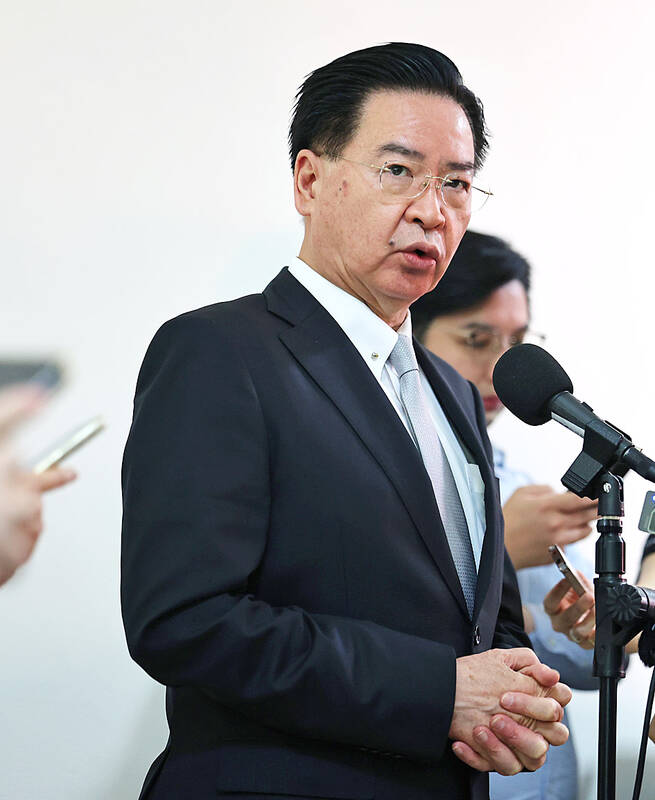Taiwan intends to fight for itself in any armed conflict with China and is unclear as to what countries might stand beside it, Minister of Foreign Affairs Joseph Wu said (吳釗燮).
In an interview on Friday last week with Sky News Australia, Wu said that Taiwan, with a population of 23 million compared to China’s 1.4 billion, has to defend itself and is not asking other countries to fight for it.
Regarding who might fight alongside Taiwan in the event of a war with China, Wu said: “This is a very good question.”

Photo: CNA
“A lot of people are debating strategic ambiguity or strategic clarity, but to us, we know our own responsibility,” Wu told the news channel from Taipei.
“Taiwan has to defend itself, the people have to defend Taiwan, this country, and we are determined to defend ourselves and we are not asking other countries to fight for Taiwan,” he said.
US President Joe Biden has repeatedly said that US forces would help defend Taiwan, although US official policy remains ambiguous over if and how forces would be dispatched.
Australian Minister for Defence Richard Marles in March said that his country had made no promise to support the US in any conflict over Taiwan as part of an agreement to obtain US nuclear-powered submarines.
Biden and the leaders of Australia and the UK have announced that Australia would purchase nuclear-powered attack submarines from the US to modernize its fleet, amid growing concern about China’s influence in the Indo-Pacific region.
Australian critics of the deal say that the US would not hand over as many as five of its Virginia-class submarines without assurances that they would be made available in the event of a conflict with China over Taiwan.
Asked if Taiwan was destined for war, Wu said: “I certainly hope not.”
“The reason is very clear: War means devastation, not just for the one who got attacked, but possibly also for other countries as well,” he said.
“And therefore, at this moment, even though we see that the tension has been rising and the conflict seems to be more likely and peace is less likely to maintain, but we need to do everything to prevent war from happening,” he said.
Wu said that Taiwan is working to maintain the “status quo” — essentially de facto independence without a formal declaration.
The US remains Taiwan’s closest military and political ally, despite the lack of formal diplomatic ties between them. US defense officials have warned of the potential of conflict in coming years and US forces have been bolstering their presence in Asia, most recently in the Philippines, to respond to such a contingency.

Taiwanese were praised for their composure after a video filmed by Taiwanese tourists capturing the moment a magnitude 7.5 earthquake struck Japan’s Aomori Prefecture went viral on social media. The video shows a hotel room shaking violently amid Monday’s quake, with objects falling to the ground. Two Taiwanese began filming with their mobile phones, while two others held the sides of a TV to prevent it from falling. When the shaking stopped, the pair calmly took down the TV and laid it flat on a tatami mat, the video shows. The video also captured the group talking about the safety of their companions bathing

US climber Alex Honnold is to attempt to scale Taipei 101 without a rope and harness in a live Netflix special on Jan. 24, the streaming platform announced on Wednesday. Accounting for the time difference, the two-hour broadcast of Honnold’s climb, called Skyscraper Live, is to air on Jan. 23 in the US, Netflix said in a statement. Honnold, 40, was the first person ever to free solo climb the 900m El Capitan rock formation in Yosemite National Park — a feat that was recorded and later made into the 2018 documentary film Free Solo. Netflix previewed Skyscraper Live in October, after videos

Starting on Jan. 1, YouBike riders must have insurance to use the service, and a six-month trial of NT$5 coupons under certain conditions would be implemented to balance bike shortages, a joint statement from transportation departments across Taipei, New Taipei City and Taoyuan announced yesterday. The rental bike system operator said that coupons would be offered to riders to rent bikes from full stations, for riders who take out an electric-assisted bike from a full station, and for riders who return a bike to an empty station. All riders with YouBike accounts are automatically eligible for the program, and each membership account

A classified Pentagon-produced, multiyear assessment — the Overmatch brief — highlighted unreported Chinese capabilities to destroy US military assets and identified US supply chain choke points, painting a disturbing picture of waning US military might, a New York Times editorial published on Monday said. US Secretary of Defense Pete Hegseth’s comments in November last year that “we lose every time” in Pentagon-conducted war games pitting the US against China further highlighted the uncertainty about the US’ capability to intervene in the event of a Chinese invasion of Taiwan. “It shows the Pentagon’s overreliance on expensive, vulnerable weapons as adversaries field cheap, technologically